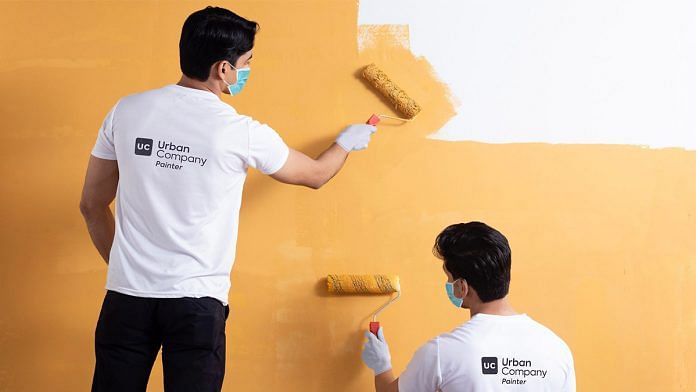
New Delhi: Urban Company, the home services start-up, had the best working conditions for ‘platform workers’ this year while food delivery apps such as Zomato and Swiggy had the worst conditions, a new report has said.
Platform workers are variously referred to as ‘independent contractors’ and delivery/driver partners in these companies.
The report by FairWork India, a wing under the UK-based FairWork Foundation, evaluated working conditions on digital platforms and scored them based on five principles of ‘fair work’ — developed through multi-stakeholder meetings at the United Nations Conference on Trade and Development (UNCTAD), the International Labour Organisation, and in-country stakeholder meetings in India, Germany, and South Africa.
The five principles are fair pay, fair conditions, fair contracts, fair management and fair representation.
The report, published Wednesday, examined a category of platforms that offer ‘work on-demand via apps’ in sectors such as domestic and personal care services, logistics, food delivery and transportation.
Zomato founder accepts responsibility
The FairWork Foundation studied and rated 11 platforms for the report and of them, Urban Company scored 8 out of 10, e-commerce website Flipkart scored 7, and grocery delivery apps Dunzo and Grofers scored 4.
The bottom of the list comprised e-commerce site Amazon, grocery app BigBasket, home construction and renovation company Housejoy and Indian ridesharing company Ola with a score of 2 each.
However, the worst working conditions were recorded in Swiggy, Zomato and ridesharing app Uber. All three managed to score just 1.
In a tweet Thursday, Zomato founder Deepinder Goyal took “full responsibility” for the “abysmal scores”.
All of us here at @zomato take full responsibility for our abysmal scores in this area, and we will leave no stone unturned to perform better in these rankings next year.
— Deepinder Goyal (@deepigoyal) December 16, 2020
At first, 12 platforms that provided location-based platform work in India were identified. However, Uber Eats was acquired by Zomato in the interim and was therefore dropped.
For each of the remaining 11 platforms, worker interviews were conducted along with secondary research.
“As in other parts of the world, platform workers in India are predominantly paid a piece rate (i.e. per task), and are typically classified by the platforms as ‘independent contractors’, or as driver / delivery ‘partners’. One major concern is that such workers do not benefit from labour regulations pertaining to wages, hours, working conditions, and the right to collective bargaining,” the report said.
Other details from the survey
The report also noted that there was insufficient evidence indicating that workers on seven of the 11 platforms earned the minimum wage rate, after accounting for costs.
Urban Company, Flipkart, Grofers, and Ola were the exceptions, it said.
While some platforms provided accident insurance, their workers were unclear of the procedures to make claims.
Only Urban Company and Flipkart were able to demonstrate that additional measures were taken to actively improve working conditions. These were also the only two platforms that acknowledged a collective voice for workers.
However, no platform wished to negotiate with worker associations and unions.
During the course of the research, six to ten participants from each organisation were interviewed in Bengaluru between November 2019 and March 2020.
In all, the foundation spoke to 113 workers in 92 interviews lasting 15 to 90 minutes.
The Fairwork India team is spearheaded by the Centre for IT and Public Policy (CITAPP) at the International Institute of Information Technology, Bangalore (IIIT-B), along with partners at the University of Oxford and the University of Manchester.
Subscribe to our channels on YouTube & Telegram
Why news media is in crisis & How you can fix it
India needs free, fair, non-hyphenated and questioning journalism even more as it faces multiple crises.
But the news media is in a crisis of its own. There have been brutal layoffs and pay-cuts. The best of journalism is shrinking, yielding to crude prime-time spectacle.
ThePrint has the finest young reporters, columnists and editors working for it. Sustaining journalism of this quality needs smart and thinking people like you to pay for it. Whether you live in India or overseas, you can do it here.